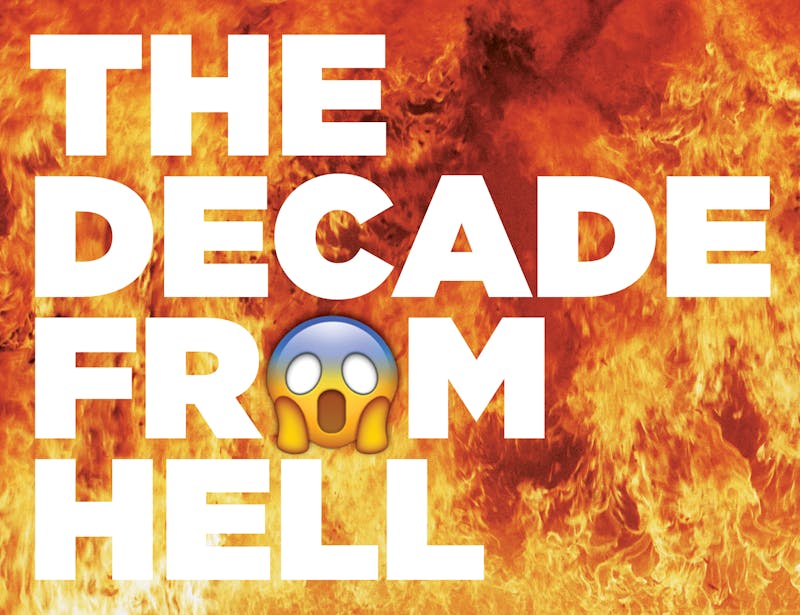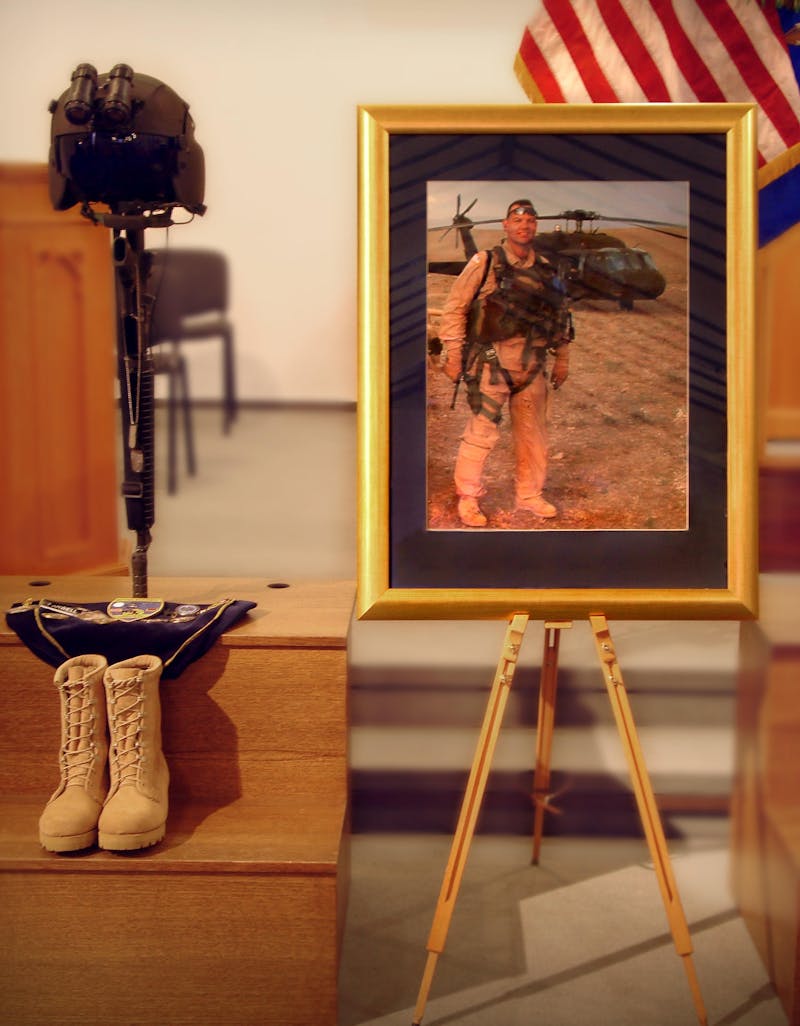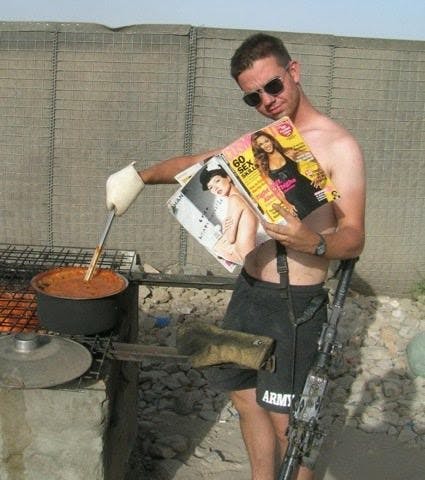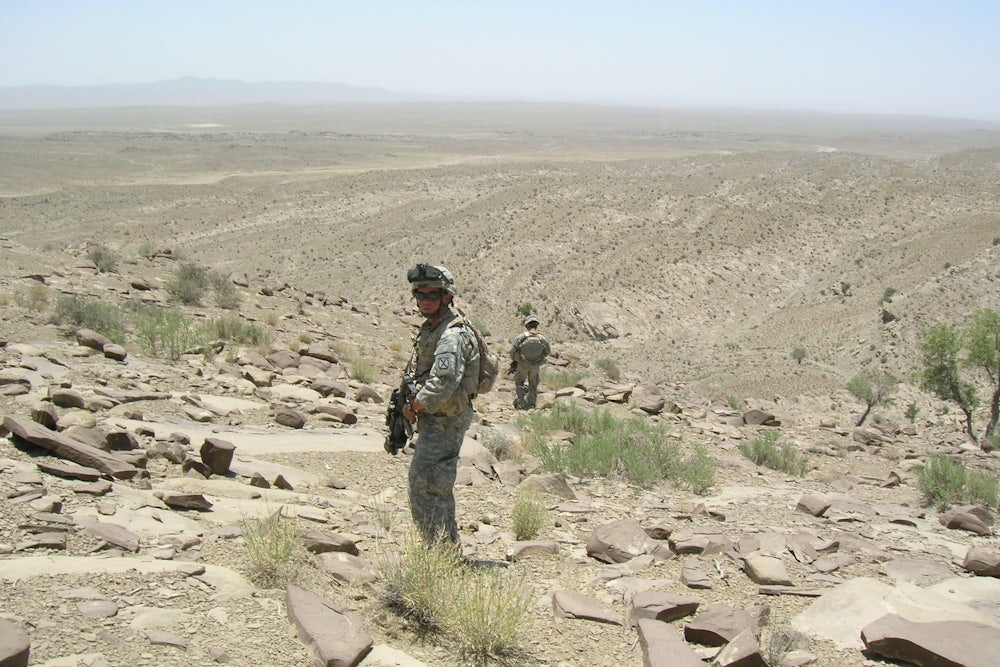Welcome to the Decade From Hell, our look back at an arbitrary 10-year period that began with a great outpouring of hope and ended in a cavalcade of despair.

A decade ago, I was in hell; now I’m on my way to Paris. All day all night; cheap flights—Fayetteville, Frankfurt, France. During our layover in Frankfurt, my fiancée and the kid decide they like Germany, something to the clean, orderly airport; noticed immediately, liked very much. I don’t mention the mouse I’ve seen scurry across the floor and under a vending machine. I certainly don’t mention the last time I was in Frankfurt. We’re here for Thanksgiving. I have much to be thankful for.
By the time we’re in Paris, rest is in order. They sleep in like normal people. I’m up early. I am getting a Diet Coke; I drink a case of it a day. I am taking a walk. I am doing route reconnaissance—a French word—riding the Metro to scout the way to the opera house and then walking back. If I do it that way, I can also look for surveillance—another French word—in a half-ass way. I dress it all up as a gag, a mental exercise, a physical game of Go where I never see any of the opponent’s pieces and lose track of my own half the time. I do it everywhere I go. I’m still wired pretty tight; these little things keep me loose enough not to snap, keep from thinking about other topics. That’s what I tell myself. The past still finds a way to jimmy whatever locks I put on the present.
My last year in the Army, bored in my barracks room during my safe stateside tour after the war, I’d gotten obsessed with Dante Alighieri’s Inferno. I read every translation I could and then wrote a bad novel manuscript about two veterans in New York reenacting Dante and Virgil’s journey. There’s a statue of Dante in Paris, I remember, walking toward the opera house. Maybe we can see it before we go. There’s a marathon going on around me. Only the serious runners are passing me now, long, wiry bodies with dayglo shoes and militant eye-protection. Above my head, full dress-grey overcast lifts to blues and Bob Ross happy clouds. Facing the opera, above the Café de Paris, is a building-cum-billboard: a four-story likeness of Will Smith, beatific blankness in lotus repose, levitating in a stylish, saffron-colored puffy coat beneath a light bulb. GENIUS IS BORN CRAZY is written in English in large block letters, the French translation below: LE GÉNIE EST FOU PAR NATURE. The ad is for Moncler, high-end Eurosportswear.
A decade ago, Will Smith produced a reboot of The Karate Kid. I was in Virginia, waiting to get out of the Army. Ten years ago, I joined Twitter. Ten years ago, my oldest brother was still alive. I hadn’t thought seriously about killing myself since that stretch right before he was killed in that helicopter crash, a day after Groundhog Day, 2010.
No medical marijuana for me on this trip; that Arkansas card only works in the States. When I first moved overseas—to Turkey, at age 6, just before the first Gulf War and after my dad went back on active duty in the Air Force—Dad rented a movie for the family to watch, because it said on the box it was set in Turkey. That Midnight Express is set in Turkey is true, though it takes place mostly within a Turkish prison. It didn’t provide many clues to our new home, but it dissuaded me from ever smuggling hashish. Now, at home, I’ll eat an edible or smoke a joint to chill myself out; in Paris, I try to walk it off instead.
Almost a full decade. The news report had been brief—a Black Hawk helicopter crash in Germany—and then I knew. I lay awake all night in the apartment rented by my soon-to-be-ex-girlfriend, a civilian public affairs intern for the Army. The next morning, my dad called to tell me. He’d been told by dress-uniform soldiers knocking on their door in Arkansas.
I called my brother’s commander in Germany and respectfully requested that he issue me orders to escort my brother’s remains back to the United States for burial. I packed my bags and prepared my dress uniform. I refilled prescriptions, I filled out paperwork. I flew from Virginia to Frankfurt. The last time I’d been there was on R&R from Afghanistan, visiting my brother and his family and touring Europe for two weeks. Now I was talking with my brother’s undertaker, who was my ride to the airport.

A few days later, I am the last person to board the commercial flight out of Germany, wearing my uniform, following my orders, and saluting my brother’s coffin as it is loaded into the cargo bay. I have not slept a full night in days; I won’t rest that month. I drink on the plane and watch Inglorious Basterds.
Touchdown, Atlanta, the same process in reverse, as a freak snowstorm hits. All hotel rooms booked, the pilot on my Delta flight lets me crash in his; there are two beds. Another tarmac salute the next morning. Fly into Salt Lake City. Aunts and uncles meet me at the terminal. So do Patriot Guard Riders, bikers there to escort the hearse up to Idaho. I have little patience for Patriot Guard Riders. I have little sleep. I pop a pill and again hitch a ride with the undertaker, following my orders. If you’re ever tempted to sentimentalize the military, imagine wearing the same polyester suit for a week of road-tripping with morticians and flying commercial, trying to get most of your dead brother, stowed in a box under a flag, through customs with dignity.
I get out of the Army a couple months later; it’s official on June 26, 2010, but I’ve been on terminal leave for a month, growing a beard, crashing with a friend in Brooklyn. I leave the service with a letter of reprimand from a three-star general and a letter of recommendation from a four-star general, neither of which anyone has ever asked for since. I figure I’ll go back to college. I haven’t saved any money from the Army—the $18,000 in blood-money combat pay was wiped out with the rest of the stock market in 2008.
Within a week of being an officially discharged veteran—the VA says I have a 30 percent service-connected disability, PTSD; they’ll rate me higher with time—I get a second DUI, crashing my truck into a tree somewhere past Keswick, Virginia, driving drunk to pick up another veteran buddy in trouble. I go into the hospital with a cop following behind me, discover an allergy to Haldol that involves abdominal seizures, and wind up listening to Walker, Texas Ranger while strapped, writhing, to a backboard for four days. Discharged once they know the compression vertebrae fracture I sustained in the accident is stable, I leave the hospital and Virginia.
I move back in with my parents, take classes at the University of Arkansas, and hire a lawyer who gets me a deal: 10 days in jail in Northern Virginia for the second DUI, after we bury the co-mingled remains of my brother and his crew in Arlington. The Army didn’t pick up all the pieces the first time we buried him in Idaho in February, so they’re having another funeral, this time with the Old Guard. No driving for me for years after that. I get out of jail; in Northern Virginia, I am hospitalized once more after passing out somewhere in Arlington—I can’t recommend removing one’s own catheter, just in case that point isn’t clear—then I am arrested twice in two consecutive days at Reagan National Airport. One charge is for “defrauding an innkeeper,” one of the oldest statutes on the books in Virginia.
Back in Paris, outside the Crédit du Nord branch on Boulevard des Italiens, someone has spray-painted ANTICAPITALISTE. Another nearby bank branch bears a message as well, neat letters in red paint, a foot tall: POLICE DE L’ETAT CHIEN DU PATRIARCAT. A marathon runner in a black hijab strides past me, fast and confident in her pace, and I follow her past a bag store, a comedy club, a hookah bar, and a brasserie. These are untouched by graffiti.
Now I know the way to the opera and back. I return to my family; it is fun to see Paris through their eyes. We see the outside of the opera, take pictures. We eat cheese. We’ll see the inside tomorrow. The kid wants to see the Eiffel Tower. There, four French soldiers patrol the tourist lines. They wear berets but pack helmets along with their carbines and combat load. Three of the soldiers are men, one a woman. All carry their weapons well, with confidence: serious-looking professionals, patrolling a potential combat zone.
The nice lady gives me a break on the ticket price when I show her my VA ID card and ask for the disabled discount. What is your disability? the ticket clerk asks. PTSD, I answer. La guerre. I smile awkwardly to show that I have it under control enough to get to the top of the Eiffel Tower. She asks no more questions. The view from the top is spectacular; the kid takes a picture of me and my fiancée mid-kiss, overlooking the Seine. We hop in a cab to Sacré-Cœur. It drops us off at the base of the hill. We walk up, taking pictures as we go. Inside, I touch some holy water—never hurts—and pose next to a statue of St. Michael the Archangel, slaying the demon. Outside, official signs—and graffiti—warn of pickpockets. We drift down the hill for dinner.
I drifted in 2011. New York, San Francisco; short-term relationships, short-term jobs, short-term stays in psychiatric facilities. Ward 1A, Fayetteville, Arkansas. San Francisco VA, one night of observation in the locked ward, leading to a month’s stint at the Palo Alto VA’s Menlo Park Psychiatric Campus. I was kicked out of the Men’s Trauma Recovery Program for coming back drunk from a weekend pass, hanging out with a woman I met on Match.com. I moved in with that woman, a chef with a bulldog; we lived in San Jose and Santa Clara. I went to Berkeley when it didn’t work out, and my Gold Star parents bought my no-account ass a bus ticket back to Arkansas. An article I wrote got some attention, and there was the possibility of more writing work. They let me stay in the yellow room. I don’t imagine it was any more pleasant for my parents than it was for me.
If I work, I am not a loser. If I work, I am not worthless. If I work, I am something. On Twitter, I reach out to Michael Hastings. He takes a mentor’s interest in me and my writing. Soon I’m working on a story for Rolling Stone with him about an American soldier from Idaho who’d been taken hostage by the Taliban, named Bowe Bergdahl. I work on that the spring of 2012 and get myself back into the University of Virginia for a summer session, hoping to finish my degree but not making much effort to go to class. The story comes out, and I work with Hastings on another piece, this one about a CIA station chief who’d been arrested with a crack pipe and a gun in Virginia Beach while on the lam from the feds.

I spend that summer sleeping on the couch of a student from Alabama until we start sleeping together. I attend a Barack Obama reelection rally with Hastings in Charlottesville. We begin work on another story, this one about John Brennan. The year goes fast; I last see Hastings over Memorial Day in D.C. That June, I fail my “News and Reality” class. Hastings dies in a car crash in L.A., two days after calling and telling me to lawyer up and get ready for the FBI. I move to Berkeley with the woman from Alabama. Paranoia, you might imagine, is high; by Christmas, I’m back in a mental hospital, Canyon View in Twin Falls, this holiday gift provided by my dad after I flawlessly jack-in-the-boxed out of his red truck while it was doing 45 on the highway north of Jackpot, Nevada—but that’s a whole other story.
When I get out of that nuthouse, I rent a two-story house in Arkansas with the woman from Alabama, and a men’s magazine sends me to cover a Turks & Caicos beachside symposium of psychiatrists, psychologists, and trauma researchers. In between poolside chats and sunning in the sand, I drink. As I cover the shrinks’ meeting, I am also their guinea pig, a demonstration dummy for the “counting method” and “somatic experiencing.” I go home, and I have not healed. The woman from Alabama knows this. By the end of 2014, she moves out and I move into an apartment. She leaves me with a cat named Marie Claire and no illusions that it’s anything other than my fault.
In 2015, midway through a decade from hell, my life is saved by the editors of Playboy magazine, and I begin a hard climb up Mount Purgatory. Playboy sends me to Chicago, where I get an experimental PTS treatment called a stellate ganglion block. I am a broken-enough human that having a nine-inch needle threaded through my neck to my spine sounds like it can’t hurt. The injection in the neck doesn’t fix everything—I doubt anything ever can—but it helps more than anything I’ve done before. I quit drinking and tell my psychiatrist I would like to go off the salad bar of psych meds the VA has me on. I catch more breaks; by 2016 I have a contract for a book about Bergdahl. I can drive again. I get a Subaru Outback. Sometimes Marie Claire comes with me on reporting trips. I put thousands of miles on that car. It takes a long time for Bergdahl’s court-martial and longer to write the book. All sorts of improbable things begin to happen—Donald Trump becomes president, there is a full solar eclipse that crosses 13 states, and a friend sets me up on a blind date with a woman in Fayetteville that works out well—we get engaged in the spring of 2019.
The spiral staircases in the Arc de Triomphe seem to impart the double-helix misery of France’s martial DNA in their well-worn spiral steps, vertigo-inducing when I look down. The only way for me to get anywhere is to hug the railing and stare straight ahead, considering each next step as it comes, ignoring the impulse to throw myself down the open center. This sounds worse than it is. I’ve had suicidal thoughts and acted on them, but not in over a decade now—and this isn’t that. I’ve heard that new mothers sometimes imagine themselves killing their children in horrible ways, which can cause confusion and guilt: This phenomenon is explained as an evolutionarily sophisticated unconscious protective brain function—by imagining these horrible things, one also imagines how one will respond to them, or not do them, and all those horrible thoughts cumulatively turn good, as they prepare a person for all sorts of worst-case scenarios that are unlikely until they’re not. I try to think about how this is all good training, like the street-level recon or, increasingly, writing about the fires that continue to rise at home and overseas.
Back on ground level, we look at the eternal flame set at the base of the Arc; Jackie Kennedy admired the symbol enough to install one over JFK’s resting place in Arlington. On the Metro, an old woman, begging, wails in a strange pitch—half childscream, half ululation—and it hits me just so. Dropping euros in her cup, I lose it. I’ve been flooding since the eternal flame. It happens; memorials are powerful. I can’t do much else but cry at this point. I’m not crying because I’m sad, but because whatever else this decade was, it was one where I was lucky, while others were dead. I had a family, a home, and a chance to make of the next decade whatever I wished.
When I get back to Arkansas, Thanksgiving over, the decade dying, I lay a copy of Inferno, a copy of Purgatorio, and a copy of Paradiso we bought at Shakespeare and Company on the high shelf next to the standing desk where I write. This week there are strikes in Paris. Massive protests. The shelf is stacked with translations of Dante: copies of Inferno on bottom, Purgatorio in the middle, Paradiso up top. The desk blocks my view of any of the spines but Paradiso while I’m working; as I stand here and look out the window, I can’t see the past. I got off Twitter a year ago. I see my fiancée and our dog—120 pounds of mixed Anatolian Shepherd and St. Bernard that needs a walk. I see gardens I’ve planted there, and through the rosebushes and awnings and vicissitudes beyond them, against all logic, I see something better ahead.
